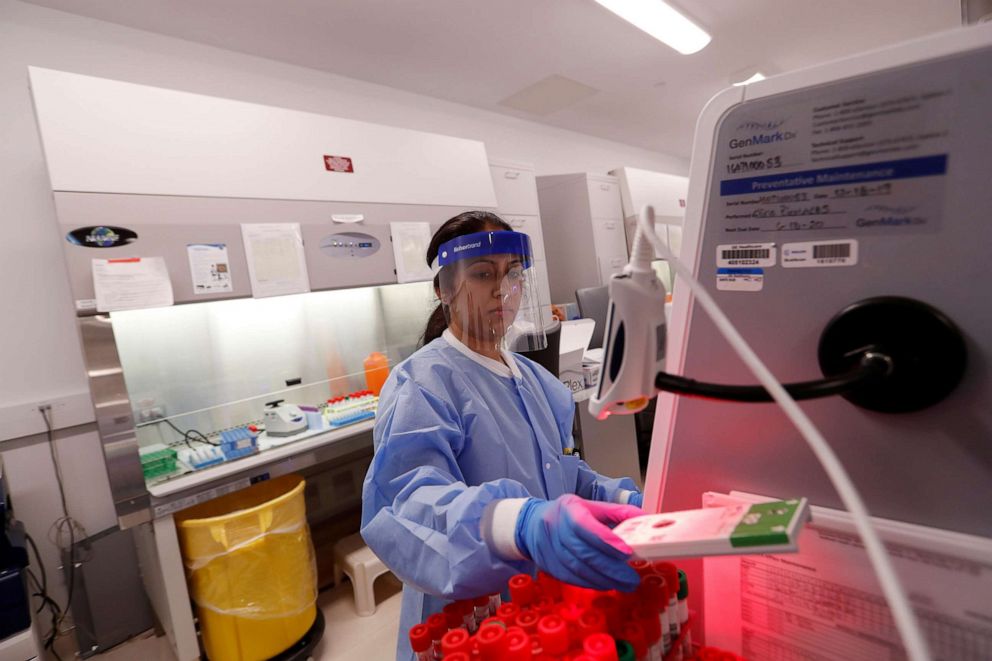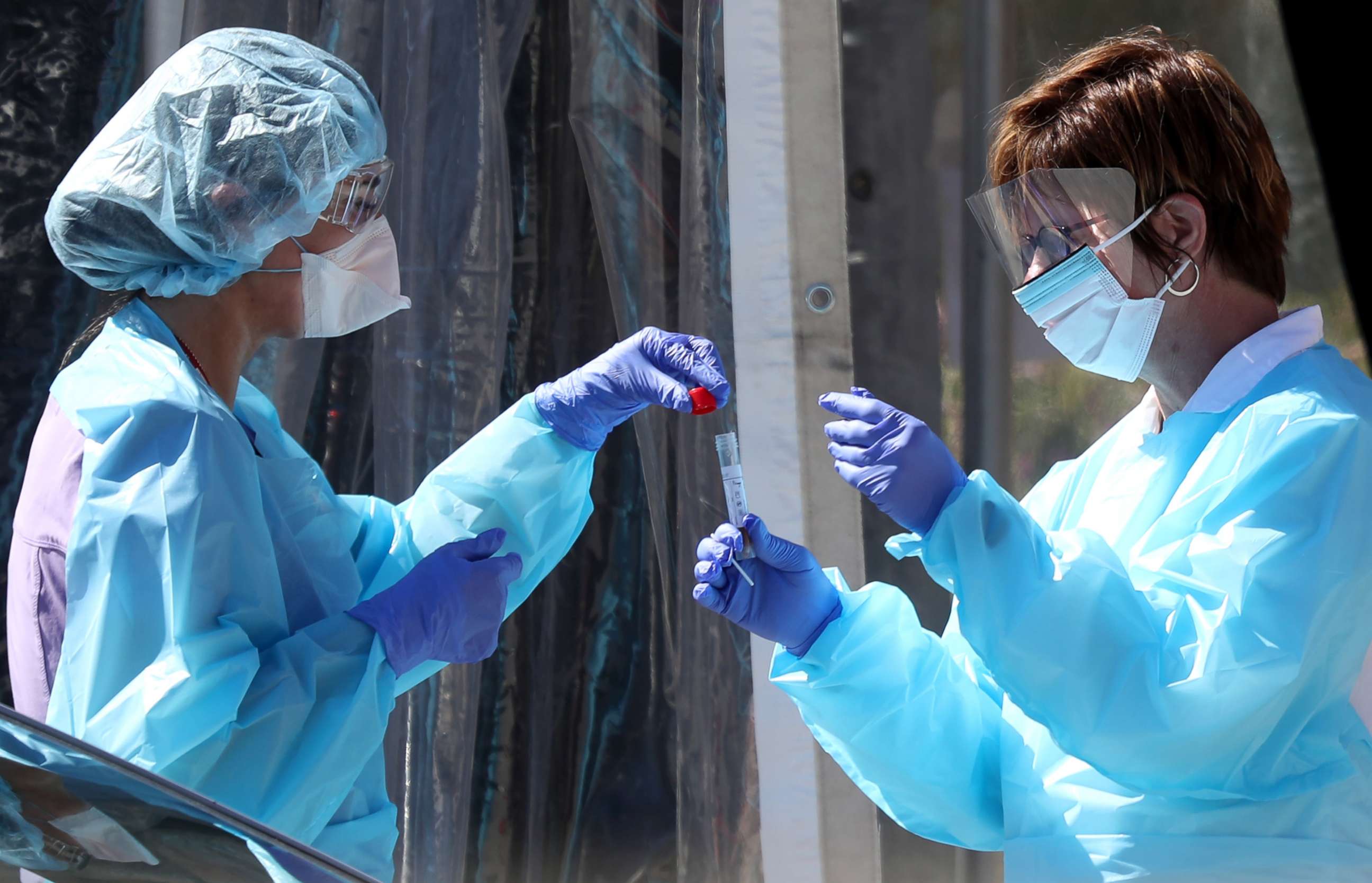What to know about coronavirus testing, including drive-thru clinics, as COVID-19 spreads in US
Here's what you need to know about coronavirus testing protocols
As confirmed cases of coronavirus continue to climb in the U.S. and around the world, questions about the virus abound, including how to know whether you have COVID-19 or not and where and how to get tested.
Unlike other diseases with distinct symptoms, novel coronavirus, formally known as COVID-19, has signs that mimic a cold or flu, including fever and cough, but also include shortness of breath. Symptoms range from mild in most cases to severe, requiring hospitalization and critical care.
Some countries have been more aggressive than others in testing, like South Korea, which deployed tens of thousands of tests early on in the outbreak, compared to the United States, which initially only tested those with travel contacts.
The number of people tested in the U.S. has grown since then, but experts say the government should be testing more. Dr. Anthony Fauci, the head of the National Institute of Allergy and Infectious Disease, called the testing system that was in place "a failing."
Here's what you need to know about testing:
Do I need a test?
It depends.
Despite President Trump saying last week that "anyone who wants a test can get a test," officials say that getting everyone tested is a long-term goal. Currently, testing is limited and should be for those who really need it, public health officials told ABC News.
As of March 13, the Centers for Disease Control and Prevention (CDC) labs have tested some 3,900 specimens of the virus, while U.S. public health labs have tested over 12,000 specimens. More than 81 public health labs are online in all 50 states and are conducting testing, according to the CDC, with testing results still pending.

Generally, the CDC says the decision should be left up to your doctor.
"Clinicians should use their judgment to determine if a patient has signs and symptoms compatible with COVID-19 and whether the patient should be tested," according to the CDC.
Those who should receive priority testing include: hospitalized patients with symptoms compatible with COVID-19; individuals over 65 who show symptoms; those with underlying health conditions; and health personnel who had contact with a suspected or confirmed COVID-19 patient, the CDC said in a March 8 release.
The CDC said doctors should encourage their patients "to stay home and contact their healthcare provider by phone for guidance about clinical management."
"Patients who have severe symptoms, such as difficulty breathing, should seek care immediately. Older patients and individuals who have underlying medical conditions or are immunocompromised should contact their physician early in the course of even mild illness," the CDC said.
Public health officials told ABC News that the push for testing has become a distraction and likened it to frenzy-buying of medical masks, tying up valuable resources.
Why test?
Many COVID-19 symptoms are similar to the common cold and influenza, but only testing can confirm an infection. This is different, for instance, from China, which for a period of time included clinical diagnoses in its count in addition to lab-confirmed tests. Scientists told ABC News that changing that methodology could complicate tracking the disease.

Public health officials told ABC News that testing is necessary mainly to track the spread of disease and ensure proper treatment and isolation for those infected, especially since COVID-19 is an influenza-like illness.
How does it work?
On Friday, the White House announced a new testing protocol where prospective patients are directed to a screening website. If they have symptoms, they will be directed to a drive-thru testing site, like those in Denver and elsewhere. Those tests will be sent to labs for analysis, said Dr. Debbie Birx, the White House coronavirus response coordinator.
But public health officials told ABC News that it is not like taking a pregnancy test or other common medical tests. Instead, it is more like the test for Ebola, they said, providing a set of data as opposed to a yes or no answer.
Under the current protocol, according to officials, test administered by hospitals or clinics typically involve:
-Two sets of Personal Protective Equipment (PPE)
-20 to 25 minutes to put on and take off PPE.
-Transporting the sample to the lab -- a process called real-time PCR (Polymerase Chain Reaction)
-A certified epidemiologist confirms every positive test.
-Results are entered into the system.
Any test conducted on someone under quarantine requires even more resources and protection, the officials told ABC News.
Under the new protocol, using the drive-thru sites, "the goal is for individuals to be able to drive up and be swabbed without having to leave your car," President Trump said on March 13. The test uses a nasal swab, Birx said.
How long will the results take?
It depends. Results had been taking a few days, but the new testing procedure would take 24 hours from start to finish, Birx said.
Can I test negative and later test positive?
Under the CDC-developed test, a negative result means the virus was not detected in the patient's sample, which is possible in the early stages of infection.
"For COVID-19, a negative test result for a sample collected while a person has symptoms likely means that the COVID-19 virus is not causing their current illness," the CDC said.
What if I test positive?
As ABC News' chief medical correspondent Dr. Jen Ashton and other medical experts have pointed out, there is no treatment for this virus.
All medical professionals can do for patients diagnosed with COVID-19 is keep their body healthy to allow it to fight off the virus. Ventilators are used to assist in breathing in some cases and antibiotics are used to fight off secondary infections a patient may develop.
Experts also say it will take a year to 18 months to develop a vaccine because testing it in real-world environments and ensuring it works is time-consuming.
What are the new tests coming?
Three labs, Everlywell, MicroGenDX and Nurx -- have made it possible to test for COVID-19 right from your living room.
Home kits allow patients to swab at home, send samples to a central lab and have results within days. However, swabs are in short supply, so many of these companies are expecting supply chain problems and are actively looking for workarounds.
All the at-home testing kits have to get shipped to a lab for results. The Everlywell and Nurx tests get results between 48 hours or "within days" while MicroGenDX's COVID-19 Rapid PCR Test has a 24-hour turnaround from time of receipt.
MicroGenDX will have the capacity to process over 8,000 samples per day beginning April 1 or sooner.
Traditional testing labs such as Hologic, LabCorp and Abbott -- are working to speed up their existing testing capacity.
Hologic has FDA approval to provide results for coronavirus tests in less than three hours and to process up to 1,150 tests in a 24-hour period.
LabCorp expects to perform 10,000 tests every day and by the end of the month conduct 20,000 per day.
Abbott is scaling up production at its U.S. manufacturing location to reach up to one million tests per week by end of March. Their m2000 RealTime testing system is currently available in hospitals and molecular laboratories and ships 150,000 laboratory tests immediately.
What to know about Coronavirus:
- How it started and how to protect yourself: Coronavirus explained
- What to do if you have symptoms: Coronavirus symptoms
- Tracking the spread in the US and Worldwide: Coronavirus map
Additional reporting from ABC News' Erin Schumaker and Christina Carrega




